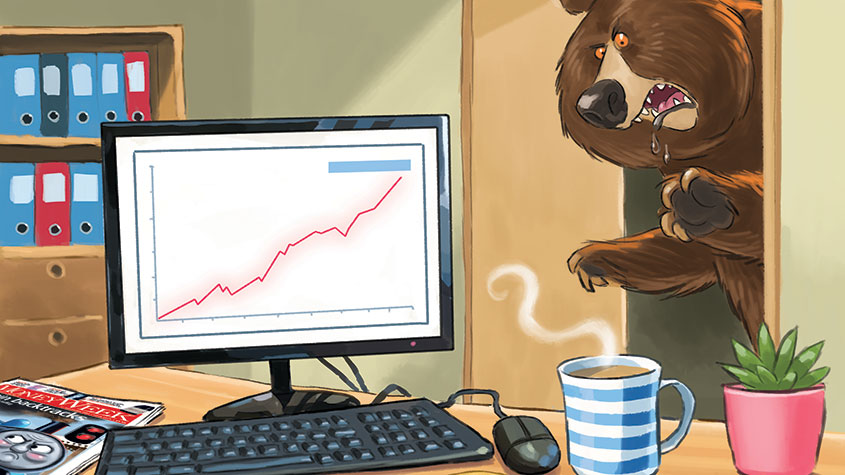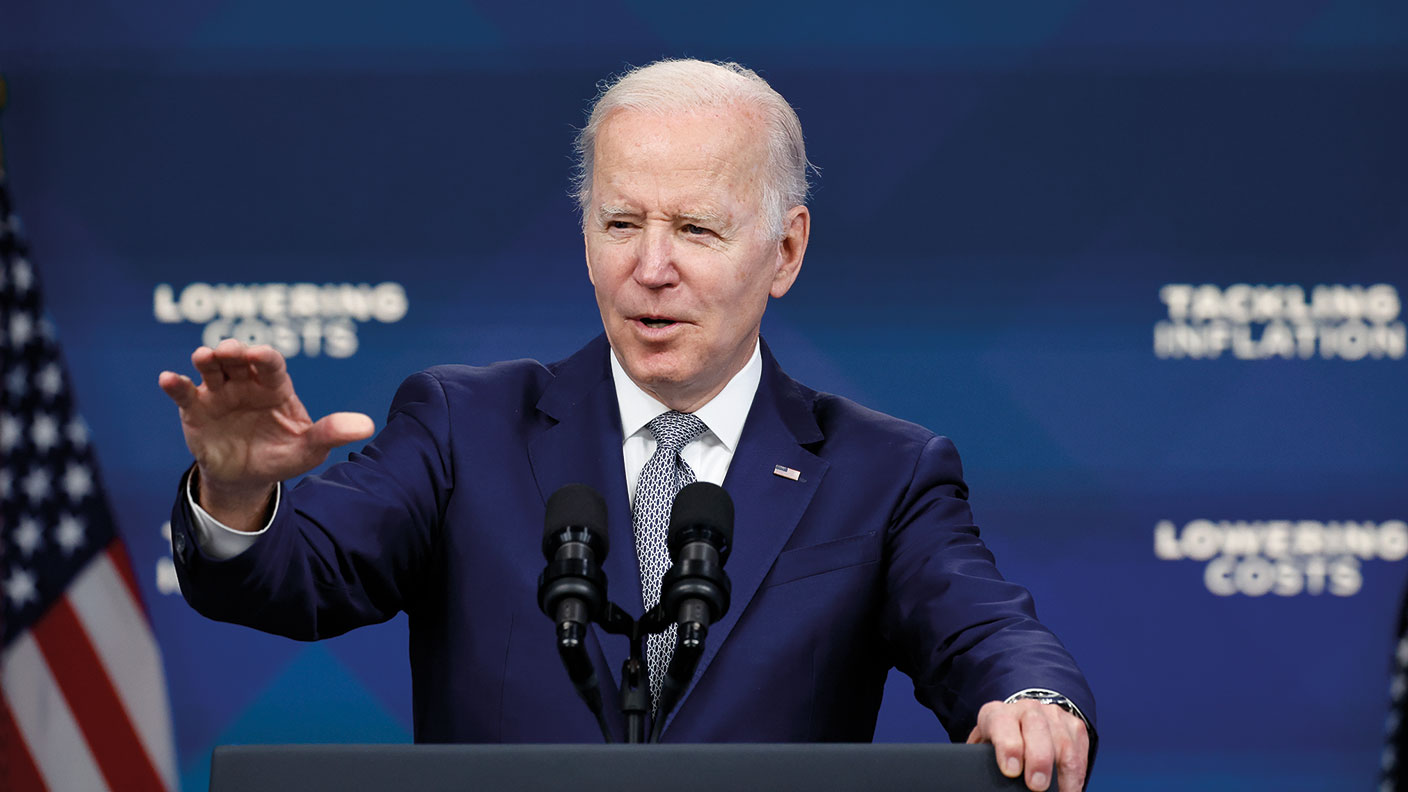The bell that marks the top of the market
There are plenty of signs that the stockmarket is due a downturn, says Merryn Somerset Webb. It's just a question of when.

Get the latest financial news, insights and expert analysis from our award-winning MoneyWeek team, to help you understand what really matters when it comes to your finances.
You are now subscribed
Your newsletter sign-up was successful
Want to add more newsletters?

Twice daily
MoneyWeek
Get the latest financial news, insights and expert analysis from our award-winning MoneyWeek team, to help you understand what really matters when it comes to your finances.

Four times a week
Look After My Bills
Sign up to our free money-saving newsletter, filled with the latest news and expert advice to help you find the best tips and deals for managing your bills. Start saving today!
No one rings a bell at the top. Instead you have to figure out for yourself when it is time to sit out an overvalued market and wait for a better time to buy. That's what every fund manager will tell you. But it isn't 100% true.
In almost every collapse there is a bell of some kind. It's just that most people are so caught up in the frenzy that they don't hear it. That might be the case today.
You can read some of the story of the flotation of Chinese e-commerce giant Alibaba here. Some think its growth potential is such that a price/earnings ratio of 61 times offers good value. David Stockman (who we interviewed back in 2013) isn't one of them.
MoneyWeek
Subscribe to MoneyWeek today and get your first six magazine issues absolutely FREE

Sign up to Money Morning
Don't miss the latest investment and personal finances news, market analysis, plus money-saving tips with our free twice-daily newsletter
Don't miss the latest investment and personal finances news, market analysis, plus money-saving tips with our free twice-daily newsletter
According to the author of The Great Deformation: The Corruption of Capital in America, Alibaba doesn't offer any hint of a sustainable business model to its bubble-drunk investors. Instead, it is "a purely derivative mass merchant of e-commerce... rolled into a convoluted financial pyramid that would have made Goldman Sachs' ill-fated schemes of 1929 look reasonable".
It has no "inventories, no stores, no warehouses, no patents, no state monopoly and virtually no fixed assets or working capital". It just isn't worth $230bn, or anything like it.
So why does anyone think it is? Why did Wall Street chuck so much money at an over-priced "mass merchant operating in a precarious economy"? Because "Wall Street is a momentum-driven casino that is now over-valuing everything that moves".
This sounds like an extreme view. But almost every indicator you look at says something isn't quite right in the US stockmarket. Tim Price, editor of The Price Report, referred to the market as a "tinderbox".
We also looked at how the cyclically adjusted price/earnings (Cape) ratio, one of the few trustworthy valuation measures, is at historically high levels in the US, despite the fact that the market hasn't even reached its previous inflation-adjusted peak yet. If history is any guide, that suggests miserable average stockmarket returns over the next decade.
I like Cape as a measure. But it isn't much good as a short-term indicator. What worries me rather more in the immediate term is the tail-off in share buybacks.
We don't approve of these at the best of times. But the key point is that companies themselves have been the biggest buyers of US equities for the last few years quantitative easing has allowed them to borrow cheap money, which they have then used to buy their own shares and so push prices up.
That trend has come to an end: Andrew Lapthorne at Socit Gnrale notes share buybacks fell by over 20% between the first and second quarters of 2014. Something else may keep the euphoria going when central bankers are desperate, anything can happen.
We wouldn't be surprised if, in a few years, we'll be looking back and agreeing with Stockman that the listing of Alibaba was a clear sign that, in 2014, Wall Street is "off its rocker."
Get the latest financial news, insights and expert analysis from our award-winning MoneyWeek team, to help you understand what really matters when it comes to your finances.

-
 Can mining stocks deliver golden gains?
Can mining stocks deliver golden gains?With gold and silver prices having outperformed the stock markets last year, mining stocks can be an effective, if volatile, means of gaining exposure
-
 8 ways the ‘sandwich generation’ can protect wealth
8 ways the ‘sandwich generation’ can protect wealthPeople squeezed between caring for ageing parents and adult children or younger grandchildren – known as the ‘sandwich generation’ – are at risk of neglecting their own financial planning. Here’s how to protect yourself and your loved ones’ wealth.
-
 What to do as the age of cheap money and overpriced equities ends
What to do as the age of cheap money and overpriced equities endsEditor's letter The age of cheap money, overpriced equities and negative interest rates is over. The great bond bull market is over. All this means you will be losing money, says Merryn Somerset Webb. What can you do to protect yourself?
-
 Investors are bullish – but be very careful
Investors are bullish – but be very carefulEditor's letter Many investors are buying the dip, convinced the latest upswing is the start of a new bull market. The odds are that it’s not, says Andrew Van Sickle. The bear has unfinished business.
-
The MoneyWeek approach to investing
Editor's letter At MoneyWeek, our aim is simple: to give you intelligent and enjoyable commentary on the most important financial stories, and tell you how to profit from them. So how do we do that?
-
 Celebrity bitcoin ads echo the subprime mortgage crisis
Celebrity bitcoin ads echo the subprime mortgage crisisEditor's letter A wave of ads featuring celebrities punting crypto to the masses are reminiscent of how low income Americans were encouraged to take on loans they couldn’t afford, says Merryn Somerset Webb.
-
 Will the UK's property slowdown turn into a house-price crash?
Will the UK's property slowdown turn into a house-price crash?Editor's letter As the cost-of-living crisis intensifies and interest rate rise, it is hard to see reasons for UK house prices to keep rising, says Merryn Somerset Webb.
-
 The unintended consequences of ESG investing
The unintended consequences of ESG investingEditor's letter Many people are refusing to invest in energy companies, citing "ESG" concerns. But we still need fossil fuels, says Merryn Somerset Webb, and will for years to come. Boycotting the sector is a bad idea.
-
 What sardines can teach investors about today's markets
What sardines can teach investors about today's marketsEditor's letter A California tale of “eating sardines” and “trading sardines” can help us divide investments into speculative and real, says Merryn Somerset Webb. Something that's very useful when looking at today’s markets.
-
 The market finally seems to be getting it
The market finally seems to be getting itEditor's letter Reality checks are coming fast to the markets, says Merryn Somerset Webb – with even 2022’s safe havens beginning to reflect recession worries.